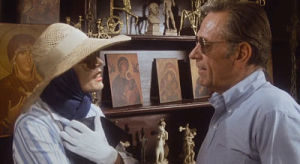STUDIO: Olive | DIRECTOR: Billy Wilder | CAST: William Holden, Marthe Keller, Jose Ferrer, Frances Sternhagen, Henry Fonda, Hildegard Knef, Michael York
RELEASE DATE: 10/28/14 | PRICE: DVD $24.95, Blu-ray $29.95
BONUSES: none
SPECS: PG | 114 min. | Drama | 1.85:1 widescreen | monoRATINGS (out of 5 dishes): Movie
| Audio
| Video
| Overall
Billy Wilder’s (Sabrina, Ace in the Hole) cynical attitude made him seem years ahead of his time in the Forties and Fifties. By the Seventies, however, when cynicism was part of the national zeitgeist, he was viewed as too old-fashioned and had a hard time finding budgets.
Fedora (1978) was his last “personal” project (his next, final film, Buddy, Buddy, was something offered to him by MGM). It is a throwback to Wilder’s older pictures, Sunset Boulevard in particular. It’s a curious mixture of his jaded sensibility and a tribute to the glamor of old Hollywood.
The script by Wilder and his writing partner I.A.L. Diamond, based on a novella by Thomas Tryon, offers a fascinating variation on the Garbo mythos. In this version, Fedora (Marthe Keller) is a superstar who quit the movie industry at the height of her fame, but aches to make a comeback. Her companions and caregivers refuse to let her, though, so she lives in a mansion on the island of Corfu.
Independent producer Barry Detweiler (William Holden, playing an update on his opportunistic character from Sunset Boulevard) comes to the island intent on getting her to star in his new feature. What follows is both a clever look at the “prison” of fame as well a solid mystery, in which Detweiler learns the secret of Fedora’s youthful appearance (interestingly, Wilder and Diamond place this major revelation just about midway through the picture).
The film was shot with German and French funding, but the masterstroke was the casting of Holden, who solidly links the film back to Hollywood’s heyday. He also serves as an excellent mouthpiece for Wilder’s complaints about the “new Hollywood,” expressed in one speech about how “it’s a whole different business now — the kids with the beards have taken over.”
Holden isn’t the only link back to Wilder’s earlier films. Fedora benefits from the participation of two master craftsmen: production designer Alexandre Trauner (an Oscar-winner for Wilder’s The Apartment) and composer Miklos Rozsa (an Oscar-nominee for Wilder’s Double Indemnity). The film thus has the distinct feel of a Golden Age Hollywood feature, without the sad, tarnished quality of Cukor’s The Blue Bird and Minnelli’s A Matter of Time.
The one element in the film that is distinctly un-Wilder-like is the dubbing of Keller and her aged companion the Countess Sobryanski (Hildegard Knef) by German actress Inga Bunsch. Wilder reportedly did it because he discovered that their voices were too indistinct to be understood, but Ms. Bunsch’s heavily Teutonic tone moves the film sporadically into area of camp — bringing to mind the oddly dubbed, intentionally amusing voice that Robert Aldrich had Kim Novak use in The Legend of Lylah Clare (1968).
This unfortunate dub-job may detract a little from the film, but Fedora remains Wilder’s last great statement on the movie business. His brand of cynicism might have seemed quaint at the time the film was released, but with hindsight we can see in Fedora the spirit that later drove Blake Edwards’s darker S.O.B. (1981) and Altman’s lacerating The Player (1992).
|
Buy or Rent Fedora
|
|||
|---|---|---|---|
DVD |
 |
 |
|

Leave a Reply